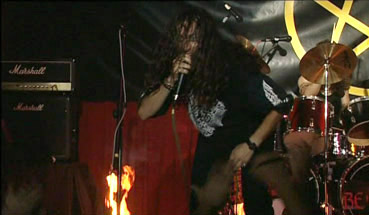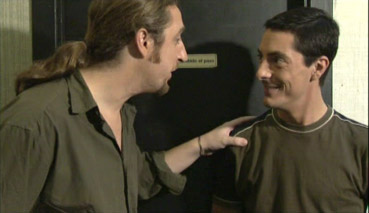|
Have you ever wondered what Satan's minions used to listen to before the advent of heavy metal music? Oh yeah, it was rock 'n' roll. Then again, playing Great Balls of Fire backwards never prompted susceptible teenagers to cut each other's throats for the glory of Beelzebub. Mind you, I've never bought into that particular piece of spurious moralising. Listening to Metallica just makes me want to rock. It's those preening, dance-in-sync boy bands who smile like they're in toothpaste commercials and talk off stage about their love for Jesus who make me want to go bugshit with an AK-47.
I've no such problems with Toni Belcebú, the successful, metal-influenced rock singer at the centre of the film bearing his stage name. We get to hear about him first on a TV news piece, where the dark rep of his music is given a boost by a wave of suicides that coincide with the release of his new album. Surely it wasn't that bad? But he's not the only one of interest here. Before we get to him we meet drug-addicted prostitute Mani, who lands a two-year spell in jail for taking part in a robbery that ended in two corpses and a flipped car. And there's Ángel, a thin young Christopher Reeve lookalike who lands a job shooting bizarre porno, which is tricky for a sin-free innocent with a cheerful disgust for this sort of sexual exploitation. But he comes recommended so he's hired nonetheless.

Seeming unrelated at first, the three stories gradually start to interconnect. Toni turns out to be Mani's old lover and the last person to see her sister before she vanished. Ángel is staying at the same apartment building as Mani and gets to meet her when she locks herself out and asks him for help. He's not too keen – she's a woman after all – but eventually opens his door and accepts her invitation to pop in for a drink. He asks for milk. The stories become further interweaved when Mani drops in on Toni and is quickly re-seduced, and the revelation that the porno house is actually owned by Toni delights unlikely rock fan Ángel, who enthusiastically seeks his autograph. By now Ángel is getting a taste for his work and willingly agrees to film a special party that Toni is hosting, which promises to expose him to sexual peculiarities he hasn't even dreamed of.
So where's the satanic horror promised by the DVD cover? Well that starts when Toni, or Mr. Belcebú as his lackeys insist that visitors call him, gets a visit from a demon, a typically ugly gargoyle that turns into a hot naked rock chick when the pair are interrupted. It drops in on Toni suddenly while he's soaking in the bath to explain the evils of marketing men and how the rock star would be better off working for the forces of everlasting night. Toni can't believe that he's "talking to some kind of giant gremlin," but when shown a vision of the nose dive his career will likely take without the gremlin's help, he soon gets on board.
As you should have guessed by now, Belcebú doesn't take itself too seriously, but then how could it? Briskly paced and enthusiastically played, its low-key comedy credentials are established in the opening store robbery, where the hold-up man is dismayed to find his disapproving mother is one of the customers. It's carried through in Ángel's relentlessly cheerful Clark Kent innocence; in the actress who pauses her preparations for an animal sex shoot to say Hi to the new employee; in the hired goon who enthusiastically re-enacts a beating he has just dished out; in a pair of company execs who play like the Abbott and Costello of the Spanish business world; and, of course, in Toni's bathroom encounter with the giant gremlin, who announces its presence by passing Toni a towel and whose terrifying vision of future events consists of little more than the news that one day Toni be all washed up and replaced by the next bright young thing. Wow, who'd have thought?
Director Sergio Blasco plays Toni with a delicate comic touch, but it's Oscar Pastor as Ángel who most confidently walks the line between the daft and the serious without ever overplaying the absurdity. Mani's hard times and gradual descent give the drama a little gravitas, the darker side of her profession making an appearance in the shape of three jocks out for a rough evening, and as played by Mai Romero, her drift back into addiction really does register. But even the prostitutes have their lighter moments, as in the enthusiastic response a customer who cheerfully asks "Hey mama, would you give me a tit wank?"

The
sex is there but the horror is surprisingly restrained,
at least for the main body of the film. Come the party climax,
however, Blasco the director goes completely nuts in a delirious
blitz of blood, bullets, rock music, enormous demonic genitalia,
satanic sex, torture, explicit close-ups, charred corpses,
flying sub-demons, scampering body parts, sexual assault
by wooden pole, beheadings, fire and lightning. Ángel,
by then on a perverted cameraman's cloud nine, just keeps
on filming.
The budget may be low and loose ends are left to flap in the wind, but the energy and enthusiasm and good humour of the director and his fellow cast and crew make Belcebú a quirky treat for broad-minded horror fans with a taste for the perverse. It's a kinkily fun ride to a finale designed to delight the dedicated but offend just about everyone else. And in case the title Belcebú feels a bit too obscure, Blasco supplies us with an alternative: Take Me, I'm Your Whore From Hell. No problem reading that one.
Belcebú was shot on DigiBeta and looks rather good. The 1.77:1 transfer is non-anamorphic but in other respects it has quite a bit going for it, the colour, contrast and detail all rather pleasing. Digital grain is very visible at times, but is not distracting, and the print is clean, presumably struck from a digital video master. The image is really dark in places but deliberately so, and the detail is still there. This is a film designed to be watched late at night in a darkened room.
The Dolby 2.0 stereo track also pulls its weight, at least in terms of clarity and separation. The dialogue appears to be post-dubbed, but this is not exactly unusual for Spanish genre cinema.
Making of Belcebú (6:58)
A brief but busy behind-the-scenes featurette built around an interview with director Blasco, who describes the film as Faust set in the 1990s. Includes the car flip stunt and the consequences for the local resident who refused to move his own parked car, despite police advice.
Trailer (1:39)
A brisk sell that unsurprisingly includes brief grabs from that climax.
Belcebú 'Quiero Tu Muerte' (2:38)
A music video from a track performed in the film by Belcebú and his band that inevitably includes clips from the film.
Promo Art
3 posters for the film.
There's also the usual small collection of stills grabbed from the film, trailers for City of the Dead, 99 Women and Venus in Furs and music extracts from albums on the Triple Silence label.
Not one for the casual horror viewer or those who think those American remakes of Japanese horrors are "really cool," Belcebú is one for the specialist fans and is definitely a cult film in the making. Just don't be fooled by the punch-pulling in the first half – that climax, brief though it will feel and out of step with previous scenes though it may be, is outrageous enough to be worth waiting for. Non-anamorphic transfer aside, Redemption have done rather well by the film on this UK DVD release.
|